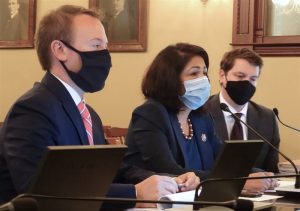Legislative maps spark contentious debate, await Tuesday night action
By Peter Hancock Capitol News Illinois — August 31, 2021
Rep. Lisa Hernandez, center, a Cicero Democrat and chair of the House Redistricting Committee, presents a new version of legislative maps Tuesday ahead of an expected Tuesday evening vote on the maps. (Capitol News Illinois photo by Peter Hancock)
SPRINGFIELD – Democrats in the General Assembly unveiled yet another set of proposed new legislative district maps Tuesday morning, just hours before the start of a special session to consider them, sparking the ire of Republicans and voting rights advocates alike.
It was the second set of proposed maps introduced in as many days, which left members of the public with little time to analyze them or assess how they would affect individual communities or minority groups.
“I’m just going to reiterate what I’ve been hearing from thousands of people over the last several months. We need at least 30 days to review this map,” said the Rev. Robin Hood, of the Chicago-based United Congress of Community and Religious Organizations, or UCCRO. “It would be unfair to us if we didn’t have the time to get the map out to all our people and make a decision based on expedience.”
Hood and other advocates testified virtually during a House Redistricting Committee hearing that was originally scheduled for 10 a.m., but which had to be postponed because the bill containing the new proposal, House Amendment 1 to Senate Bill 927, wasn’t released until just minutes before that time.
The committee also heard from representatives of the Chicago Lawyers’ Committee for Civil Rights and the Decalogue Society of Lawyers, a group that advocates for Jewish communities in Illinois, both of which urged lawmakers to allow more time for the public to review the latest proposal.
The bulk of the 1,268-page bill is made up of lists of census block numbers, township names and other identifiers that define each proposed House and Senate district. A separate resolution explaining how the districts were drawn was expected to be introduced later in the day but would not be the subject of any committee hearings.
The Tuesday morning hearing followed one held Monday evening, during which several advocacy groups complained about getting short notice of the meeting and little time to review the proposal.
Common Cause Illinois, a political reform advocacy group, issued a statement Monday afternoon saying it would boycott the hearing out of protest for the way in which lawmakers were conducting the redistricting process.
“Since the beginning, we’ve pleaded with lawmakers to keep the redistricting process open, transparent, and accessible to no avail,” the group’s executive director, Jay Young, said in a statement. “This latest, last-minute hearing provides almost no notice to the public. The new maps will be released less than a day before lawmakers vote on them. It’s shameful, and our organization refuses to add any legitimacy to such an undemocratic process.”
Democratic leaders called the special session shortly after the Aug. 12 release of official, detailed data from the 2020 U.S. Census that showed the maps they approved in May, and which Gov. JB Pritzker signed into law, were significantly out of balance and would likely be held unconstitutional.
Two federal lawsuits were filed challenging those maps – one by legislative Republican leaders, and another by the Mexican American Legal Defense and Educational Fund, or MALDEF. Those cases are before a three-judge panel in federal court in Chicago, which has scheduled a status hearing for Wednesday, Sept. 1, to be briefed on whatever changes are made during the special session.
Lawmakers crafted the earlier maps using population estimates from the Census Bureau’s American Community Survey, arguing that it was the “best data available at the time.” It also enabled Democrats to argue that they met the June 30 deadline in the Illinois Constitution for the legislature to approve new maps, thus avoiding sending the process to a bipartisan commission where Republicans would have a 50-50 chance of controlling the process.
Republicans, however, argue that the maps approved in May were unconstitutional and, therefore, not “effective” by June 30, and they are seeking to force the appointment of a bipartisan commission.
In addition to taking up redistricting, lawmakers also continue to negotiate a comprehensive energy regulation overhaul bill that would put Illinois on a path to eliminating carbon emissions from its power generation sector.
They were also expected to take up a number of vetoes and amendatory vetoes that Pritzker issued for bills that came out of the spring legislative session.
This story will be updated with further developments.
phancock@capitolnewsillinois.







